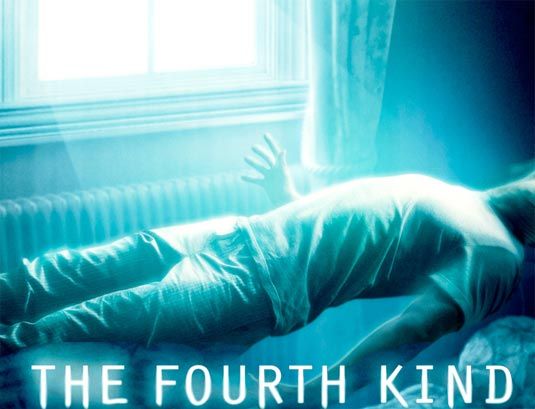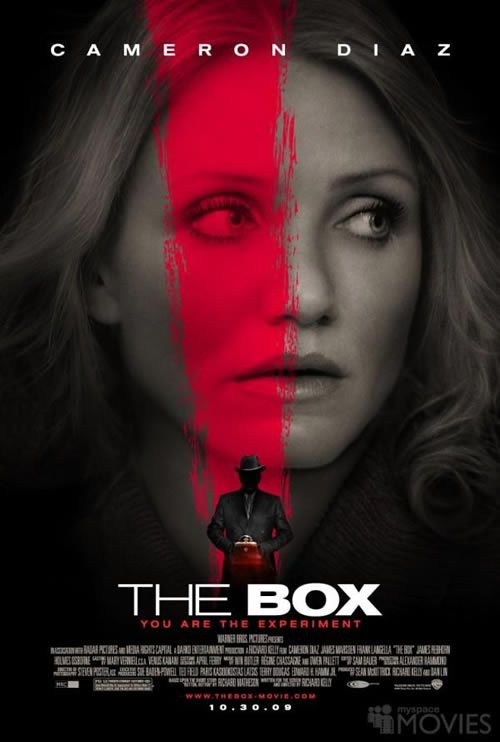
Image ©Matt Groening, all rights reserved.
So the ghosts and goblins of Halloween have passed, you already watched Paranormal Activity, and yet, you’re still in the mood for some scary, sci-fi goodness. Rest assured, because this weekend, two new movies, The Fourth Kind and The Box, will frighten the pants off of you. (Unfortunately, only one is meant to do so intentionally.) The Fourth Kind explores alien abductions through the story of an actual Alaska case study, while The Box is a psychological thriller that centers around the morality of a life-changing decision. ScriptPhD.com reviews of both films, under the “continue reading” jump. Leftover ScriptPhD Halloween candy goes to those that guess the cultural work invoked by the spoof in the picture on the right.
Review: The Fourth Kind
ScriptPhD.com Grade: B+

The Fourth Kind poster image ©2009 Universal Pictures, all rights reserved.
Television and cinema has a long history of preoccupation with alien encounters and abductions. From the sci-fi classic V, recently re-launched as a remake, to the recent hit The X-Files, from Steven Spielberg’s Close Encounters of the Third Kind to current hit Paranormal Activity, audiences have been treated to a panoply of abduction theories and scenarios, with distant alien life forms ranging from the curiously benevolent to the violently malevolent. But no movie has dared to infuse a level of sophisticated reality to its storytelling… until now. The Fourth Kind, part movie, part re-enactment, and part documentary, chronicles a curious case study in the small town of Nome, Alaska, involving a cluster of paranormal events from January 1st – January 9th of 2004 affecting a subset of the town’s population. Inexplicable disappearances, clusters of patients suffering from insomnia, and shared visions of owls taking on the form of something far more scary, more sinister. All of these events were studied and recorded by sleep psychologist Dr. Abigail Tyler (portrayed in the film by Milla Jovovich), who herself had a burden to bear over the mysterious sudden death of her husband and co-researcher. What he unearthed was a series of encounters and abductions with alien life forms affecting about 300 local patients, leaving some psychologically scarred and others violent or suicidal. When her own child goes missing in the midst of her probes, Dr. Tyler undergoes hypnosis, and a shocking journey of revelations about her own role in this saga.
The Fourth Kind is titled after the nomenclature system of astronomer and UFO researcher J. Allen Hynek, which classifies levels of interaction with artificial intelligence, from encounters of the first kind, a UFO sighting, to the ninth and ultimate kind, an alien species revelation to humans. The question that audiences will be asking, of course, is: is the movie indeed real? My take? It’s a viral marketing campaign by Warner Brothers akin to The Blair Witch Project, and an effective one at that. There was indeed a spate of disappearances in Nome in 2004, but a 2006 FBI memo attributed most of the 24 deaths to the deadly combination of alcohol and a harsh winter. Google searches for an Abigail Tyler fail to bring up any substantial websites (those that reference her have been taken down since the movie’s premiere), and neither the Alaska psychiatric licensing board nor the city of Nome has records of an Abigail Tyler. Nevertheless, writer/director Olatunde Osunsanmi pulls no punches in the reality department. Re-enactments of patient sessions are interspersed and sometimes superimposed with “actual footage” with the real Dr. Tyler. Side-by-side panels of the archival footage are supplemented with 911 calls of frightened patients and threaded with a taped interview between Dr. Tyler that recounts the events depicted in the film.
Ultimately, whether the film is an elaborate studio ploy is irrelevant, because what needs to be real is—the terror. While not quite matching the horrifying verisimilitude captured in simplistic perfection by its current rival Paranormal Activity, The Fourth Kind derives audience reaction if by the power of mental suggestion. It could happen to you. It doesn’t matter if it’s a marketing ploy, because while you are sitting in your chair, the very idea of the possibility will make the hairs on the back of your neck stand up (The ScriptPhD will sheepishly admit to having watched half the film between her fingers). With the exception of some fine scenery chewing by the skeptical local sheriff (Will Patton), the acting in the movie is first-rate. A clever and well-done editing effort mixes just the right combination of film and documentary footage to infuse a sense of building panic towards the truly surprising denouement—done with an understated, less-is-more camera pan-out. And let’s face it folks, at the end of the day, people levitating off of beds, contorted faces of agony, non-human warbled alien speech and creepy, fuzzy, black and white recordings are always sure to make the popcorn fly.
For an in-depth discussion of alien abductions, please view this featurette from Universal Pictures in which paranormal writer/researcher Marie D. Jones discusses encounters of the fourth kind and learn why she says experts believe that these similar experiences can’t just be thought of as coincidence.
The Fourth Kind opened on Friday, November 5, 2009 in theatres nationwide
View trailer:
Review: The Box
ScriptPhD.com Grade: C-

The Box image ©2009 Warner Brothers Films.
Count The ScriptPhD among those excited to see another film written and directed by Richard Kelly, the brilliant mastermind behind Donnie Darko, which remains one of my favorite cult classics of the past decade. Unfortunately for the viewing audience, Mr. Kelly’s return comes in the form of The Box, a disasterous horror film/morality tale/tragedy/unwitting comedy from Universal Pictures starring Cameron Diaz. Norma Lewis is a private school teacher in 1976 Arlington, VA. Her husband, Arthur (James Marsden), is a NASA engineer working on the Viking Mission, NASA’s first robotic landing on Mars (check out the official NASA 30th anniversary website). By all external accounts, they are living the idyllic suburban life. Though you wouldn’t know from their enormous house and Arthur’s Roadster, the Lewises are beset by financial difficulties. It is at this moment that a box shows up at their door. Accompanying it is a mysterious stranger named Arlington Steward (Frank Langella), who makes Norma an offer. If she presses the button, a stranger unfamiliar to her will die, but she will receive a million dollars, no questions asked. After engaging in some perfunctory skepticism and wrangling, the Lewises push the button. But Steward is no ordinary messenger. He is Patient X, a former NASA astronaut hit by lightning, who was reborn with paranormal activities, including arrest of cellular degeneration. The consequences of pushing the button lead into a metaphysical exploration of God, punishment for Earthly sins, and the use of science and technology to manipulate our species’ proclivity towards altruism for the greater good of the species.
The Box is an adaptation of the terrific short story Button, Button by Richard Matheson. Back in 2008, SciFiDimensions.com wondered “how the twelve pages of it will translate into a full length feature film… The film version is, in all likelihood, using the premise of the story for something much bigger, and probably much less satisfying.” Oh, how prescient they were! Kelly inflates this compact, satisfying short story with plot twists, character backgrounds, the mysticism of human morality, and the kitchen sink, all while losing its identity in the process. The obtrusive staccato violin score seems to indicate it’s a horror film, the thematic plot a morality tale, the faux-detective murder plot a suspense drama, while the inappropriate laughter elicited from the press corps during the screening revealed a comedy. The Box is one giant technospiritual experiment, for which Steward is an earthly steward. Those that choose money over moral impunity are recruited as “employees” of the experiment, and travel through one of three gateways to heaven or hell. Why a box as a symbol? Because, Arlington expounds, life is a box. We travel in a box to come to a home that is a box, to stare at a television that is a box in a body that is a slowly decomposing box only to be buried in the ultimate box. Oh my profoundness. If enough people would only choose to not press the button, the horrifying murders, zombie physical transformations, and recruits to hell would stop. As would this movie.
Among Arthur Lewis’s scientific artifacts is a large poster with a famous quote from the science fiction master Arthur C. Clarke: “Any sufficiently advanced technology is indistinguishable from magic.” This pretty much summarizes this movie’s attitude towards science. Norma’s crippling foot injury is ascribed to tissue necrosis by radiation from an X-ray machine left on by a doctor in the 1950s. In rare cases, skin destruction, tissue loss, and amputation do result from high-dose X-ray exposure, 2,000-3,000 rems. At typical absorption rates from medical X-rays (6 milliRems for joints and extremities), this would mean the doctor left the X-ray on for hours and hours and hours. To help her walk normally again, Arthur crafts a prosthetic in his chemical lab at work, a gesture both sweet and apparently magical. Norma is able to slip it into her shoe, and shake her limp faster than Verbal Kint in The Usual Suspects. While Kelly was clearly going for an atavistic throwback visually (including post-production manipulation of digital images to mimic 70s film appearance), the hokey sci-fi gadgets veer into the cartoonish and ridiculous, not the least of which is The Box itself, let alone the mystical high-tech water tanks and wind turbines that facilitate communication between Arlington Steward and “those that control the lightning”. About the only thing that the movie got right was a visual recreation of the NASA Langley facility in 1976, for which the movie recruited NASA veteran and science fiction author Gentry Lee, one of the original members of the Viking Mission team.
Despite its many shortcomings, this movie is not without some redeeming qualities. The always-bankable, marvelous Frank Langella is the cast standout. His portrayal of the mysterious Arlington Steward is understated, elegant and charming, in complete contrast to his hideous facial disfigurement. Arlington’s reactions of disappointment, fatigue and even disgust at humans’ inability to forego immorality to advance selfish desires, thus endlessly repeating the cycle of The Box, are about the only believable ones in the movie. Like the short story, the thematic exploration of psychological terror, guilt and decision-making are interesting. Do you press a button that will kill someone you don’t know but offer you financial freedom? How well do any of us know one another? Had some of the superfluous plot “twists” been minimized, The Box could have delved more into individual character development and questions of the power of technological development, but alas. “The Box isn’t big on violence or gore; it’s more of a thriller in the retro style of the movies I grew up on as a kid, and that kept me on the edge of my seat,” says Kelly. Pity. The only thing that kept me on the edge of my seat was wondering when the agony would end.
The Box opened on Friday, November 6th, 2009 in theatres nationwide
View trailer:
~*ScriptPhD*~
*****************
ScriptPhD.com covers science and technology in entertainment, media and pop culture. Follow us on Twitter and our Facebook fan page. Subscribe to free email notifications of new posts on our home page.












